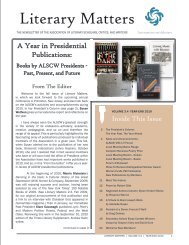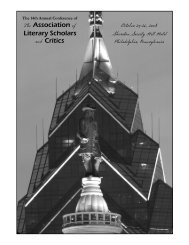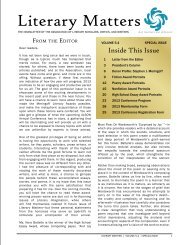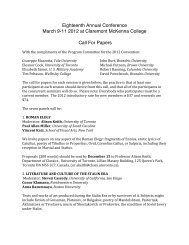Literary Matters 5.3 - Association of Literary Scholars, Critics, and ...
Literary Matters 5.3 - Association of Literary Scholars, Critics, and ...
Literary Matters 5.3 - Association of Literary Scholars, Critics, and ...
You also want an ePaper? Increase the reach of your titles
YUMPU automatically turns print PDFs into web optimized ePapers that Google loves.
There is much that is sound in Leavis’s view<strong>of</strong> Othello as a victim <strong>of</strong> self-idealization, aslater critics have <strong>of</strong>ten conceded. 7 But what Iwould urge is that both Eliot <strong>and</strong> Leavis err inregarding Othello’s last speech as arising froma “histrionic intent.” Theatrical it is, but selfdramatization,“cheering himself up,” is nothis motive in speaking at this point, <strong>and</strong> onlyby ignoring what obviously is his motive—to killhimself—could they fall into this error.Consider this: Lodovico has not left Othello asa loose cannon free to roam about the stage,but a weaponless prisoner in the grip <strong>of</strong> guardswho are about to lead him away. It is not aneasy task to commit suicide under such conditions!Why does he speak? To halt the suddenexodus <strong>and</strong> free himself so that he may die ashe chooses to: “upon a kiss” (5.2.368).His immediate motive is to free himself. Freedom,<strong>of</strong> course, has been an abiding concern <strong>of</strong>his throughout the play: “The Moor is <strong>of</strong> a free<strong>and</strong> open nature,” Iago muses as he deviseshis plan <strong>of</strong> attack at the end <strong>of</strong> Act I (1.3.400),<strong>and</strong> everything we have witnessed <strong>of</strong> Othelloup to that moment inclines us to agree. Yethis “free nature” is not marked by a carefreeoutlook; on the contrary, his need to feel unconstrainedis so powerful that preserving hisfreedom appears always to be on his mind. Ofhis marriage, for instance, he tells Iago, “Butthat I love the gentle Desdemona, / I would notmy unhoused free condition / Put into circumscription<strong>and</strong> confine / For the sea’s worth”(1.2.25–28).To view his marriage as “circumscription <strong>and</strong>7 Barbara Everette was one such, but nevertheless felt the view thatOthello is “noble” is not sentimental (“Reflections on the Sentimentalist’sOthello,” Critical Quarterly, 3 [1961], 127–39; repr. inShakespeare: An Anthology <strong>of</strong> Criticism <strong>and</strong> Theory: 1945–2000, ed.Russ McDonald [Malden, MA: Blackwell, 2004], 152–63). Others,like Robert B. Heilman in Magic in the Web: Action <strong>and</strong> Language inOthello, (Lexington: University <strong>of</strong> Kentucky Press, 1956), cite Leavis’sviews with approval (145ff.). Actually, Leavis’s theories remainedinfluential for decades; Joan Lord Hall points out that the NationalTheatre production <strong>of</strong> the play in 1964, with Lawrence Olivier as Othello,was heavily indebted to his outlook, as was Stuart Burge’s filmversion in the following year (Othello: A Guide to the Play [Westport,CT: Greenwood Press, 1999], 170ff.).confine[ment]” implies a somewhat claustrophobicfear <strong>and</strong> points to the means Iago discoversto bring him down. “The essential traitor,”as Leavis remarked, “is within the gates,”<strong>and</strong> it is by directing his remarks to that “traitor”that Iago is able to “circumscribe <strong>and</strong> confine”his victim. “Circumscription,” we should note, isbut one <strong>of</strong> a rather astounding number <strong>of</strong> “circum-”words—seven in all—that Shakespeareemploys in this play, all creating the sense <strong>of</strong>enclosure. “Circumstance,” for instance, appearsin the opening scene when Iago is explainingto Roderigo how Othello rid himself <strong>of</strong>those seeking to advance Iago’s suit:But he, as loving his own pride <strong>and</strong> purposes,Evades them with a bombast circumstanceHorribly stuff’d with epithets <strong>of</strong> war….(1.1.13–15)Kittredge glosses “bombast circumstance”here as “bombastic circumlocution,” 8 <strong>and</strong> wesee that Othello is employing language to confinehis listeners’ purposes before they can restricthis own. And note how well Iago’s description<strong>of</strong> this initial use <strong>of</strong> the “Othello magic”accords with its use in his last speech, for dowe not see him there again deploying “bombastcircumstance” to further “his own pride<strong>and</strong> purposes”?“Circumstance” appears most famously, <strong>of</strong>course, in the“[p]ride, pomp, <strong>and</strong> circumstance<strong>of</strong> glorious war” (3.3.359), a phrase thatspeaks revealingly <strong>of</strong> what Othello values in his“occupation.” And that “circumcised dog” thatmust not go unmentioned suddenly becomesthe focus <strong>of</strong> his wrath in his last speech, directingit against his own breast (5.2.64).The only discussion <strong>of</strong> this “inner Turk” <strong>of</strong> Othello’sthat I know <strong>of</strong> comes from a post-colonialcritic, Ania Loomba, who sees Othello as “anear schizophrenic whose last speech graphi-8 Irving Ribner <strong>and</strong> George Lyman Kittredge, eds., The CompleteWorks <strong>of</strong> Shakespeare (Waltham, MA: Ginn <strong>and</strong> Company, 1971),1157.22 LITERARY MATTERS | VOLUME <strong>5.3</strong> | FaLL/WINTER 2012







